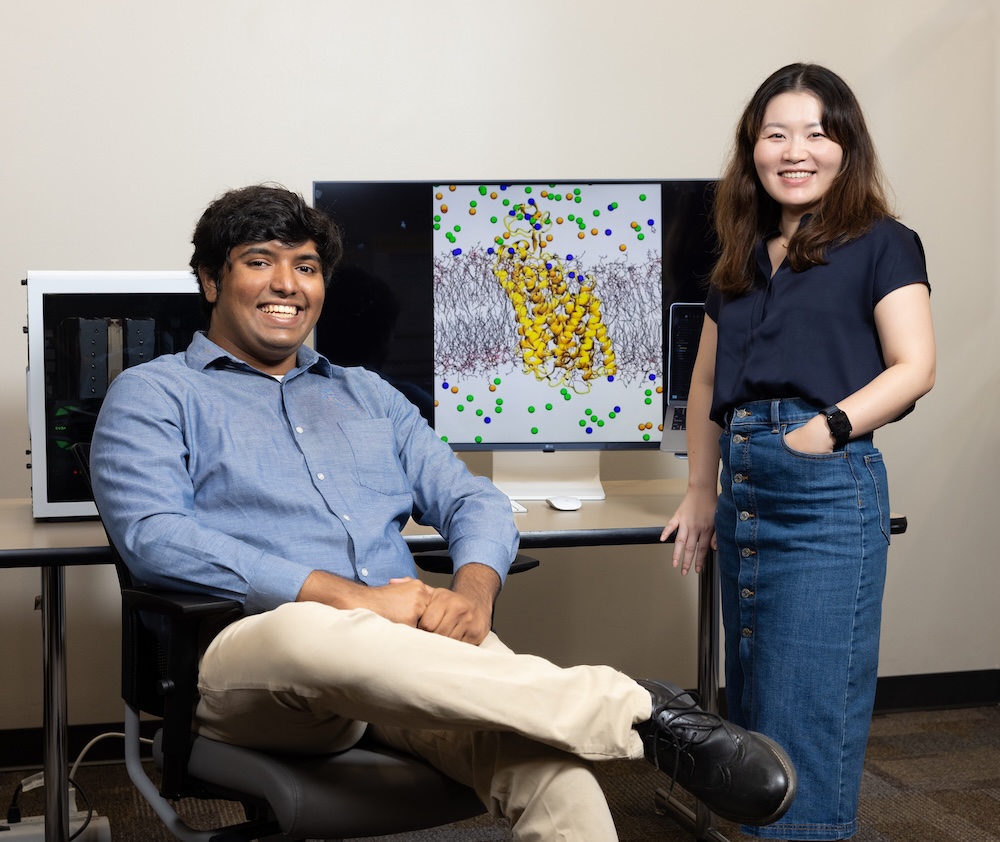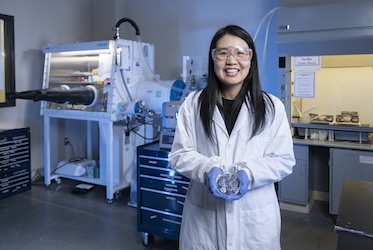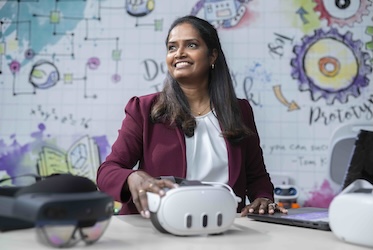

KENNESAW, Ga. | Jul 25, 2025

Housed in the College of Computing and Software Engineering (CCSE), X Lab combines artificial intelligence, health informatics, and molecular dynamics simulations to better understand how ADRD develops and how to stop it. The lab’s research focuses on visualizing how disease-related proteins behave and how potential drugs might interact with them at the atomic level.
“Alzheimer’s is a global issue, and current treatments and diagnostics are limited,” Xie said. “We are using computational methods that can speed up drug discovery while dramatically reducing costs.”
Those methods include molecular dynamics (MD) simulations, a technique that models how proteins and molecules move and interact over time. Kathilankal Jis has taken the lead on setting up and analyzing these simulations using specialized tools like NAMD2 and ChimeraX.
“MD simulations let us see how proteins react to potential drugs,” said Kathilankal Jis, who became engaged in the lab through Kennesaw State’s Summer Undergraduate Research Program. “If we can predict those interactions before going to the lab, it saves time, money, and helps guide more effective treatment options.”
To power these simulations, the team relies on the Texas Advanced Computing Center’s supercomputers and DeltaGPU supported by the National Science Foundation (NSF) ACCESS program. Previously, they worked with lab computers and university systems, often facing long wait times and limited processing power. Now, with expanded resources, they can run simulations in a fraction of the time.
“This project exemplifies the power of interdisciplinary research and the critical role computing plays in advancing healthcare,” said Yiming Ji, CCSE interim dean. “I am proud of Dr. Xie, Johaan, and the entire X Lab team for their innovation, collaboration, and commitment to making a real difference in people’s lives.”
In addition to his simulation work, Kathilankal Jis is developing a research paper that catalogs and analyzes Alzheimer’s-related databases. His aim is to help new researchers find and access critical datasets for genetics, imaging, and clinical studies.
“There is a lot of valuable data out there, but it is scattered,” he said. “We are organizing it so other researchers can use it to push Alzheimer’s studies forward.”
Xie said Kathilankal Jis’s passion and commitment is what makes the research so impactful.
“Technical skills can be taught, but passion cannot,” she said. “Kathilankal Jis started as a First-Year Scholar, then became a VIP student, and now he is a research assistant who has already presented at national and international conferences.”
Together, their research bridges the gap between computational modeling and clinical application. While the simulations produce detailed visualizations, convincing doctors and clinicians to trust those models remains a challenge, especially with AI still evolving. To address this, the team is working with clinicians and lab researchers to validate their findings and make AI-driven methods more explainable and trustworthy.
“Validation is critical,” said Xie. “We want our models to be useful to the people who need them most, including doctors, patients, and caregivers.”
Looking ahead, the team believes their work can contribute to more precise drug development, better early detection tools, and stronger collaboration between researchers across disciplines. They also hope to expand their computational methods to study other major diseases like breast cancer and cardiovascular conditions.
“Computational modeling is powerful because it is adaptable,” said Xie. “The work we are doing for Alzheimer’s can be applied to many other diseases. This is just the beginning.”
– Story by Raynard Churchwell
Photo by Matt Yung

Kennesaw State University to launch Bachelor of Science in Artificial Intelligence in Fall 2026

Kennesaw State researcher develops safer, faster solid-state battery design

Kennesaw State among nation's top universities for online degrees in U.S. News rankings

KSU researcher using VR to improve STEM education
A leader in innovative teaching and learning, Kennesaw State University offers undergraduate, graduate, and doctoral degrees to its more than 51,000 students. Kennesaw State is a member of the University System of Georgia with 11 academic colleges. The university's vibrant campus culture, diverse population, strong global ties, and entrepreneurial spirit draw students from throughout the country and the world. Kennesaw State is a Carnegie-designated doctoral research institution (R2), placing it among an elite group of only 8 percent of U.S. colleges and universities with an R1 or R2 status. For more information, visit kennesaw.edu.